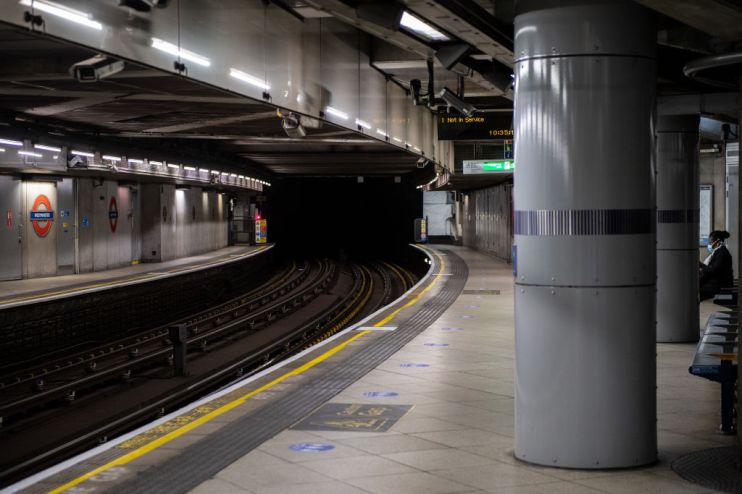Sadiq Khan: London transport fares will increase after £1.6bn TfL bailout

London mayor Sadiq Khan has said that he will be forced to increase fares on the capital’s bus and rail services after agreeing a £1.6bn bailout for network operator Transport for London.
In a statement, the mayor said that he had “no choice” but to accept the offer, which was the “only deal the government put on the table”, in order to keep services running.
In March, Khan had admitted that if he was re-elected mayor he would have to end the four-year freeze on tube fares due to TfL’s financial situation.
However, he had pledged to continue with the freeze on bus fares.
Describing the deal this morning, which consists of a £1.1bn grant and a £505m loan, as a “sticking plaster”, he warned that the cost would be felt be Londoners:
“The government is, in effect, making ordinary Londoners pay the cost for doing the right thing on Covid-19.”
“They want fares to go up next January – ending the four years fares freeze I delivered after the last election.
“They have insisted that free travel is temporarily suspended for Freedom Pass and 60-plus card holders at peak times”, he added.
From January, fares will increase on all modes of transport in line with the RPI inflation rate, plus one per cent.
This is in line with the assumptions made in TfL’s business plan for the coming year.
Conservative mayoral candidate Shaun Bailey said that blaming the government for the increase was a “complete lie”:
“He’s taking Londoners for fools. To believe Londoners can be hoodwinked this easily is disgraceful”.
Keith Prince, Conservative transport spokesman at the London Assembly, said that Khan had “some nerve” to blame the government for the fare hike.
He said: “Khan had already announced that the fare freeze would end before the country went into lockdown.
“After four years of Khan’s incompetent handling of TfL’s finances, the Mayor is trying to escape the consequences and hide behind the government’s bailout terms”.
Service levels to increase to 100 per cent
Under the conditions of the deal, Khan has committed to ramping up service levels to 100 per cent over the coming weeks:
“As staff are returning to work we are increasing services as fast as possible to get back to 100 per cent.
“From Monday we aim to run around 85 per cent of buses, 75 per cent of Tubes, restore the Circle line and re-open some of the 37 closed stations”, he said.
Other conditions include a review of TfL’s finances and government officials taking seats on the board that oversees the transport operator.
Under plans released this morning, the government said that two special representatives will sit on TfL’s board, its finance committee and its programmes and investment committee.
In addition to the suspension of the Freedom pass, the deal will also temporarily suspend free travel for under 18s.
Special arrangements will be made to ensure children eligible under national legislation can still travel to school for free.
TfL staring down barrel of £4bn loss
The deal came together after the mayor had warned on LBC radio that he would be forced to cut services unless an agreement was reached yesterday.
The public body was on the brink of issuing a Section 114 notice, a statutory acknowledgement that its finances had breached a certain level.
According to the provider, revenue has dropped 90 per cent during the coronavirus pandemic as people have remained at home, meaning the operator was burning £600m a month.
Across the whole financial year, TfL is forecasting a loss of £4bn, with a £3.2bn funding gap which has now been partially plugged by the government.
Opponents said drastic measures now needed to be taken to ensure the long term viability of TfL:
Lib Dem mayoral candidate Siobhan Benita said: “This bailout was essential but it has come with expensive conditions. TfL’s finances were in a mess before this pandemic and that seems to have weakened the Mayor’s hand in negotiations with the Government.
“We now need to radical action to secure the long-term financial sustainability of TfL, including scrapping the £1billion polluting Silvertown Tunnel project and spreading the revenue-raising burden from public transport passengers to drivers, by introducing smart road pricing in the capital.”